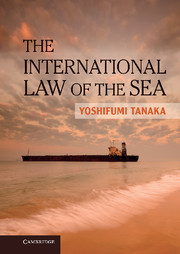Book contents
- Frontmatter
- Contents
- Preface
- Acknowledgements
- Figures
- Tables
- Abbreviations
- Table of Cases
- Table of Treaties and Instruments
- Part I The Divided Oceans: International Law Governing Jurisdictional Zones
- 1 The Law of the Sea in Perspective
- 2 Baselines and Related Issues
- 3 Marine Spaces under National Jurisdiction I: Territorial Sovereignty
- 4 Marine Spaces under National Jurisdiction II: Sovereign Rights
- 5 Marine Spaces beyond National Jurisdiction
- 6 Maritime Delimitation
- Part II Our Common Ocean: Protection of Community Interests at Sea
- Index
- References
3 - Marine Spaces under National Jurisdiction I: Territorial Sovereignty
Main Issues
from Part I - The Divided Oceans: International Law Governing Jurisdictional Zones
- Frontmatter
- Contents
- Preface
- Acknowledgements
- Figures
- Tables
- Abbreviations
- Table of Cases
- Table of Treaties and Instruments
- Part I The Divided Oceans: International Law Governing Jurisdictional Zones
- 1 The Law of the Sea in Perspective
- 2 Baselines and Related Issues
- 3 Marine Spaces under National Jurisdiction I: Territorial Sovereignty
- 4 Marine Spaces under National Jurisdiction II: Sovereign Rights
- 5 Marine Spaces beyond National Jurisdiction
- 6 Maritime Delimitation
- Part II Our Common Ocean: Protection of Community Interests at Sea
- Index
- References
Summary
Internal waters, territorial seas, international straits and archipelagic waters are marine spaces under the territorial sovereignty of the coastal State. However, the use of the marine environment for sea communication necessitates the freedom of navigation through those spaces. Consequently, marine spaces under territorial sovereignty are part of the territory of the coastal State and the highway for sea communication at the same time. The dual nature of marine spaces gives rise to the fundamental question of how it is possible to reconcile the territorial sovereignty of the coastal State and the freedom of navigation. With that question as a backdrop, this chapter will examine the following issues in particular:
What is the coastal State’s jurisdiction over foreign vessels in internal waters?
How is it possible to reconcile the need to provide refuge for ships in distress and the protection of the offshore environment of the coastal State?
What is the right of innocent passage?
Do foreign warships enjoy the right of innocent passage through the territorial sea?
What is the legal regime of international straits?
What is the legal regime of archipelagic waters?
What are the differences between the right of innocent passage, the right of transit passage and the right of archipelagic sea lane passage?
Introduction
This chapter will seek to examine rules of international law governing marine spaces under territorial sovereignty. In this regard, particular attention must be devoted to two issues with regard to the reconciliation between the territorial sovereignty of the coastal State and the freedom of navigation.
- Type
- Chapter
- Information
- The International Law of the Sea , pp. 76 - 119Publisher: Cambridge University PressPrint publication year: 2012



